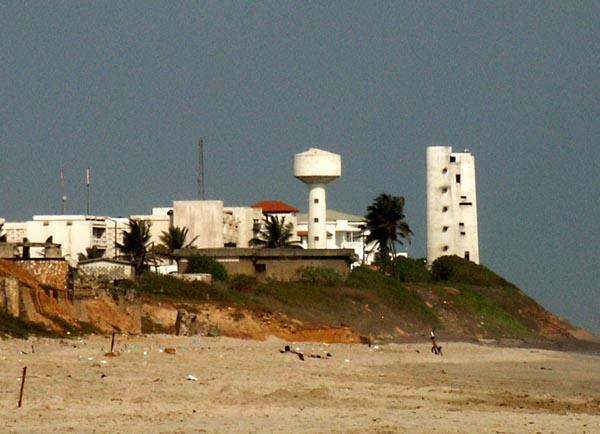
Accra, Dec. 3, GNA - The Osu Castle, the seat of government, could disappear into the sea by the year 2050 if measures are not put in place to reverse the rise of the sea level.
A preliminary studies done by the Oceanography and Fisheries Department of the University of Ghana indicated that the current rate of climatic change had made coastal erosion an imminent issue that needed to be dealt with urgently.
Dr. George Wiafe, a Lecturer at the Oceanography and Fisheries Department, was contributing to a forum organized by the Public Affairs Section of the United States Embassy in Ghana to discuss some US funded environmental activities in Ghana ahead of the December 7th United Nations Climate Change conference in Copenhagen, Denmark.
He said: "Even though the Osu Castle is on a rocky area, it could be affected. Already the coastal areas in Ada, Keta, and other parts of the country's shoreline have had severe impact of sea level rise." Dr. Wiafe said the study was conducted as part of a United State funded project to look at sea erosion and some climate change adaptation programmes.
The project will also look at assessing the wave pattern of the sea and will help the department acquire some technologies that could help them communicate changing weather patterns to farmers in the rural areas to guide their planting and harvesting times.
Commenting on the impact of climate change, he said human beings were the creators of the greatest havoc to the planet earth and advised people to adopt lifestyles that would not harm the environment.
Mr. Aaron Fishman, Regional Environmental Officer at the United States Embassy, announced that United States President Barrack Obama will travel to Copenhagen on December 9th, and noted that Obama was eager to work with the international community to get a comprehensive and operational deal on the climate.
"The United States has already started contributing towards climate change activities internationally, the US budget for the fiscal year had 1.2 billion dollars for climate change out of which 300 million dollars is for international climate change adaptation methods alone," he said. Mr. Fishman said the United States is also doing a lot to reduce emissions adding, there was currently a climate change bill before the US Senate that specifies energy efficient standards for vehicles and electrical household items.
Mr. Mike Koffman, Country Director for the US Peace Corps, said his organization was building the capacity of the volunteers to deal with the climate change issue at the grass root level and said they will be working with families in villages to get them to understand issues.
"We are training and teaching people about soil conservation, re-forestation, water conservation, health and nutrition and getting families in the villages to use less wood fuel ," he said and added that these issues affected the individuals directly and even have had impact on their lifestyles.